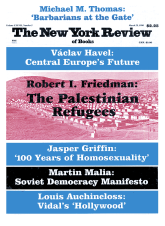To the Editors:
The case of Dr. Drago Roksandić, instructor in the Department of History at the Philosophy Faculty of the University of Belgrade, illustrates the obstacles that stand in the way of academic freedom in Yugoslavia. Dr. Roksandić is an outstanding historian of the younger generation and the author of the widely acclaimed two volume monograph on the period of Napoleonic governance in the Croatian Military Frontier (1809–1813). No historian of his generation has had a more distinguished research record in topics that concern the modern history of the South Slavs, especially the mutual relations between the Serbs and Croats. It is precisely because of his even-handed and dispassionate approach to these sensitive topics that he has become the principal target of a witch hunt mounted by a group of Serbian nationalists who control the Department of History at Belgrade.
Himself a Serb from Croatia, Dr. Roksandić pursued his Ph.D. thesis at Belgrade, until his relations with some of his senior colleagues deteriorated to the point that he had to switch his dissertation defense to the University of Zagreb. Most recently, his opponents, led by Professor Vasilije Krestić, an exponent of highly tendentious historical views, have mounted an organized campaign against Dr. Roksandić’s research and intellectual integrity. Their aim was to deprive Dr. Roksandić of his teaching position. Since Dr. Roksandić is well known as an opponent of the nationalist misuse of history, Professor Krestić and his group have concentrated their attacks not so much on his research as on his supposed “national disloyalty.” Their attempts to remove Dr. Roksandić from the University of Belgrade have recently met with almost complete success. After a series of maneuvers, three voting sessions in November and December 1989, and pressures that were exerted against recusant members of the Faculty, Dr. Roksandić was finally deprived of his teaching post.
The whole case cannot be separated from attempts to homogenize Serbian intellectuals behind the banner of national exclusivism, which is as divisive as it is dangerous for the prospects of democracy in Yugoslavia. To be sure, Professor Krestić and his vocal supporters have encountered opposition. However, the opposition has been intimidated not only by the mounting atmosphere of national intolerance, but also by the strategic support extended to Dr. Roksandić’s opponents by Serbia’s ministry of education at the final stage of the proceedings. Not since 1975, when eight philosophers were expelled from the University of Belgrade in the notorious case that attracted international attention, has academic freedom at Belgrade been compromised so seriously. It is ironic that the reinstatement of two of the eight was accomplished at the same session of the Faculty’s council at which Dr. Roksandić was deprived of his position, especially since the reversal in the fortunes of the philosophers was touted as a victory for freedom of thought in Serbia.
We ask the intellectual community to protest the persecution of Dr. Roksandić by writing to: Rector Dr. Milorad Unković, University of Belgrade, Studentski trg 1, 11010 Beograd, Yugoslavia.
Ivo Banac
P.S. This letter was co-signed by:
Daniel Chirot, University of Washington
Jan T. Gross, Emory University
Tony Judt, New York University
Norman Naimark, Stanford University
Gale Stokes, Rice University
Iván Szelényi, University of California, Los Angeles
Katherine Verdery, Johns Hopkins University
Andrzej Walicki, University of Notre Dame
This Issue
March 29, 1990



